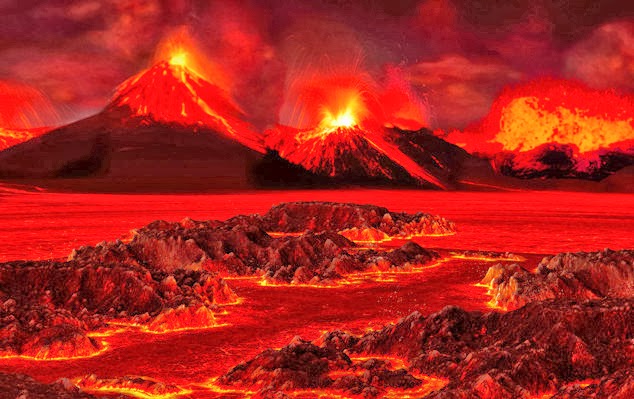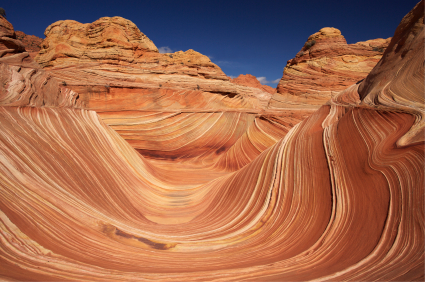Yes, you heard that right. This may seem like an absurd thing straight out of a science fiction novel, but it actually isn't that far fetched. I can guess what the first thing that comes to your mind when you hear the word extinction is (and probably my mind, too :) ... dinosaurs!
http://www.dinopit.com/5-awesome-pieces-of-cool-dinosaur-art-from-deviantart/
Sure, the extinction of the dinosaurs was a cool yet horrifying event and is the one you hear most about but it isn't even the largest extinction in the history of Earth. So you might be thinking, who cares what species lived on our planet millions of years ago? They were there, now they're not. So what?!!! I'll get to that in a bit, but just keep this in mind. Dinos dominated the planet for millions of years (so long in fact that T Rex's time was closer to our time than the time of Stegosaurus! 😵) but they died out just like that, in the blink of an eye. OK, fine, all the dinos on Earth didn't just disappear in a second, but still, ask yourself, who are the dominant animals on Earth today?
The Great Dying... sounds ominous, right? But it was real and it happened on the very same planet we now call home. The Permian-Triassic mass extinction event occurred about 250 - 300 million years ago near the end of the Permian period and caused the demise of over 95% of all marine species and 70% of all terrestrial species. That's right, folks. We are descended from the 30% of land species that manages to survive the biggest disaster on the face of our planet. So what caused this terrifying event? We may never know as all the evidence and fossils from that time have been either destroyed or buried deep beneath the Earth under many layers of rock.

http://ufothetruthisoutthere.blogspot.ca/2014/02/giant-mass-extinction-quicker-than.html
However, we do have some idea of the Cretaceous extinction that made most dinosaurs vanish off the planet (if you didn't know, birds are descended from avian dinosaurs, so yes, dinos still exist on Earth in a way). Enormous volcanic eruptions and an asteroid impact may have been key to the fall of dinosaurs and many other species near the end of the Mesozoic era. Some moviemakers (yes, I'm looking at you, Steven Spielberg) and even some scientists claim that dinos and other creatures like wooly mammoths can be brought back to Earth but I'm not even starting on that today.
http://www.koimoi.com/reviews/ice-age-collision-course-review/
So, what does this all have to do with us? Well, I'm sure you all have heard of the greenhouse effect, and no it is not a special effect you can see inside a greenhouse. 😜 Due to our burning of fossil fuels (coal, oil, and natural gas) for energy, greenhouse gases like carbon dioxide, methane, and water vapour are expelled into the atmosphere (larger amounts than ever before in history) and this contributes to more of the heat from the Sun being trapped by Earth's atmosphere and thus warming our globe (hence the term global warming you're all familiar with)! This leads to the melting of polar ice caps, rise in sea levels which results in flooding, and a lot of other terrible, horrible, no good, very bad things you do not even want to think about (catch the reference, anyone?). Many everyday things you might not realize contribute to global warming such as putting the heater/AC on in your house, riding a car, leaving electronic appliances on unnecessarily, not recycling properly, and much, much more. And these are just the small things we do, not to mention deforestation and using fossil fuels to power bigger processes. And eventually these "tiny" things could add up and before we know it, BOOM! Scared yet?
http://misinformation-special-news.info/key/g/words-global-warming-earth-burning.html
I think that we as humans have the responsibility to save our planet, not only for ourselves, but for the millions of other species that call this planet home, at least until the Sun blows up in a billion years.
But on a happier note, every little thing we do counts. So, taking care of Earth is not just the duty of scientists and government leaders, but also of you, of me, of everyone. Living on Earth is not a right, it's a privilege. And abusing that privilege can mean the end of everything. I know, a lot of big words here, but here is what I want to leave you with: Earth isn't going to be around forever, but every one of us can play our part in making sure it's around for as long as possible. That is, don't steal the Sun's job. You wouldn't want another mass extinction happening, would you? Or maybe you would. Wouldn't it be kind of cool actually? Ha ha, just kidding!
So, next time you leave your room, make sure you turn off your laptop, your light, everything. After all, the dinosaurs didn't see that asteroid coming. Your laptop and light can be turned on again, but if Earth's spark is extinguished, it is gone forever, and with it, everything we know.
https://www.britannica.com/science/Permian-extinction
https://www.sciencenewsforstudents.org/article/dinosaurs-extinction-asteroid-eruptions-doom
https://www.sciencenewsforstudents.org/article/clues-great-dying
http://www.businessinsider.com/heres-who-would-go-first-in-the-next-mass-extinction-2016-9
https://www.britannica.com/place/Pangea




